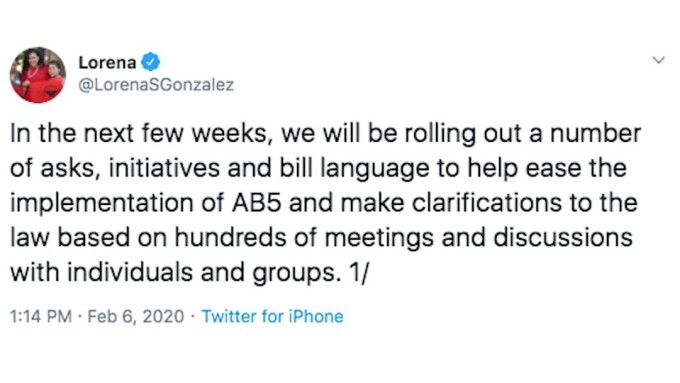LOS ANGELES — Earlier today, California Assemblywoman Lorena Gonzalez, the author of the controversial AB5 bill that forces employers to reclassify certain freelancers as employees, announced her intention to ease implementation of the bill through a number of initiatives.
Since the bill was signed into law last September, there has been confusion and anger from many sectors of the independent contractor industry over what the bill specifically means for their job status and their ability to work as freelancers, involving everyone from Uber drivers to freelance journalists to cam models.
Today, Gonzalez, who sponsored the legislation, announced several measures meant to assuage some of those fears.
"In the next few weeks, we will be rolling out a number of asks, initiatives and bill language to help ease the implementation of AB5 and make clarifications to the law based on hundreds of meetings and discussions with individuals and groups," Gonzalez tweeted.
In January, Gonzalez introduced AB1850, a California bill that would further clarify through legislation how employees are classified.
Along with the promise to ease implementation of AB5, Gonzalez detailed a number of new measures and promises, including:
- An ask for $20 million in the California budget "to fund a grant program for small non-profit community arts programs that are transitioning their employees under AB5"
- A removal of the 35-submissions-per-year cap for freelance journalists and language to "more clearly define freelancer journalism"
- Language, following consultations with "Getty, Shutterstock and photographers and videographers" that will clarify the selling of that work doesn't constitute an employment situation
- A plan "to address the unique situation regarding musicians in the next round of amendments by March"
- A statement that they "will likely have to better define Fine Artist but are trying to get their interpretation first"
- A promise for "a few more formal announcements [later this month]"
There is nothing in the initial Twitter thread that specifically points to how these changes could affect cam models, adult performers and others in the adult industry.
In a separate thread, Gonzalez, who for months has been combative online with critics of the bill, appeared chastened by the backlash, saying "[f]or the added stress that has caused anyone, or the feelings of not being heard, I am truly sorry. I am direct and straightforward, passionate about workers’ rights and too busy to directly respond to everyone, but I do listen and I care about getting this right."
To view the entire Twitter thread, click here.







